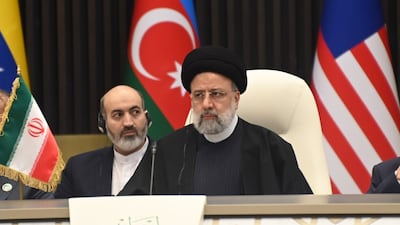Iranian President Ebrahim Raisi has been re-elected to the Assembly of Experts in the country’s elections, state-run media outlets have reported.
The 88-member legislative body, which comprises male Islamic scholars, has a remit of appointing, supervising and, if needed, dismissing the country’s supreme leader – who has the final say in all matters of state in Iran.
Ayatollah Ali Khamenei, who turns 85 this year, has been in his post since 1989.
Mr Raisi, who took office in 2021, has been touted as a possible future supreme leader.
Iranian news agency Tasnim, which is affiliated with the Islamic Revolutionary Guards Corps, on Sunday reported Mr Raisi had won 82 per cent of the valid votes in South Khorasan province, an 8 per cent increase from the last elections.
In January, the Guardian Council barred former president Hassan Rouhani, who was in office from 2013 to 2021, from running in elections for the Assembly of Experts, without elaborating on the reason.
He was first elected to the body in 1999 and in November announced he was seeking a new term.
The former leader, described as a moderate, was elected in a landslide in 2013 and 2017 on a promise to reduce Iran's diplomatic isolation.
In 2015, he agreed on a nuclear pact with six major powers, angering the political hardliners who opposed any rapprochement with the US.
The deal unravelled in 2018 when then-US president Donald Trump unilaterally ditched the agreement and reimposed sanctions that have hamstrung Iran's economy. Efforts to revive the pact have failed.
The 12-member Guardian Council, which oversees elections and legislation, disqualified 80 per cent of candidates running for the assembly in the last election in 2016.
Officials have not yet released turnout figures from Friday’s polls but some state-run media outlets reported only 41 per cent of eligible voters participated, down from 42 per cent in 2020 which was then the lowest since the 1979 revolution.
In Tehran, turnout was estimated at only 24 per cent, it was reported.
Conservatives are leading in the initial vote count, looking likely to consolidate control over Iran’s 290-seat Parliament, according to state media.
Iranians are notably less engaged with the country's leadership after a crackdown on anti-regime protests in 2022 and worsening living conditions under western sanctions, with inflation officially at nearly 40 per cent and the currency's value dropping heavily in recent months.
About 61 million Iranians were eligible to cast a ballot, including 3.5 million first-time voters, state-run media outlets said.
A number of reformists boycotted Friday's election, during which authorities twice extended voting hours to keep polling centres open until midnight.
Besides setting laws, key parliamentary functions include approving the government’s budget and international contracts.
All new legislation has to be approved by the Guardian Council, half of whose members are directly appointed by the supreme leader.
In practice, absolute power in Iran rests with Mr Khamenei.
The ballot takes time to count as authorities in Iran tally votes manually.


